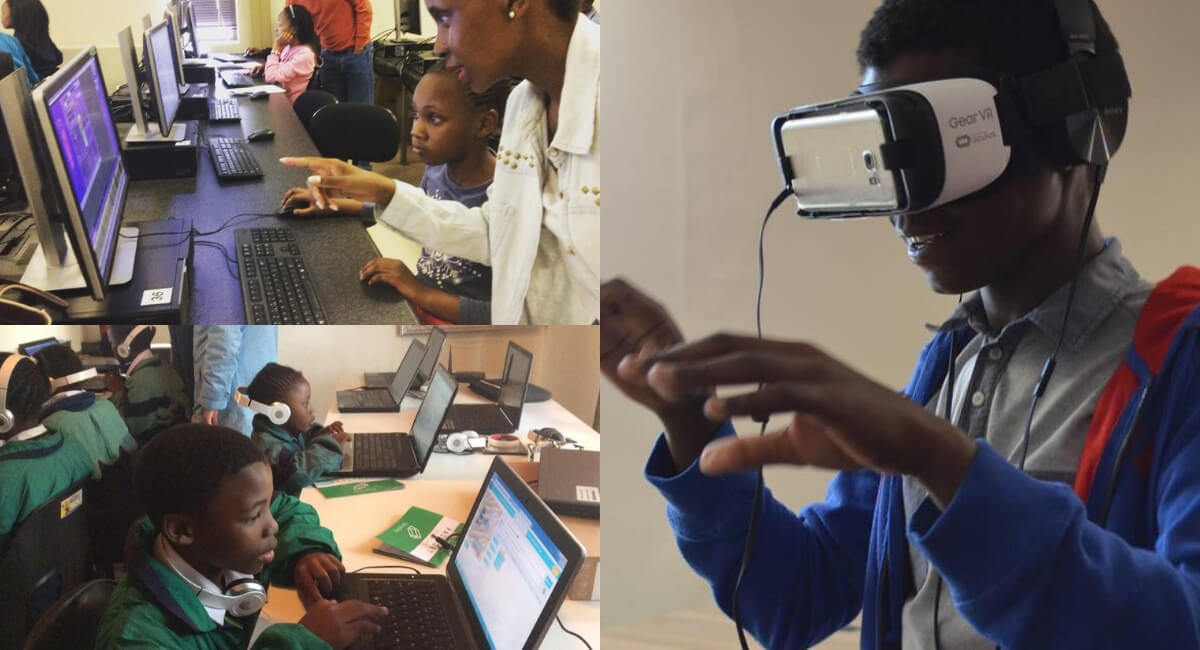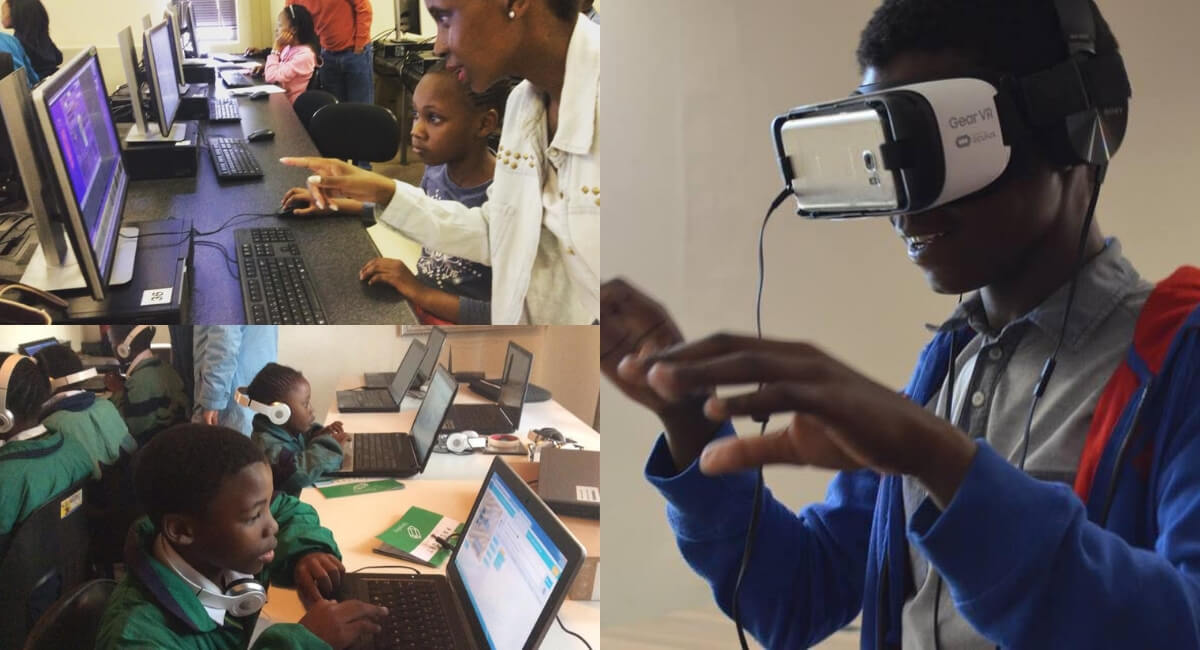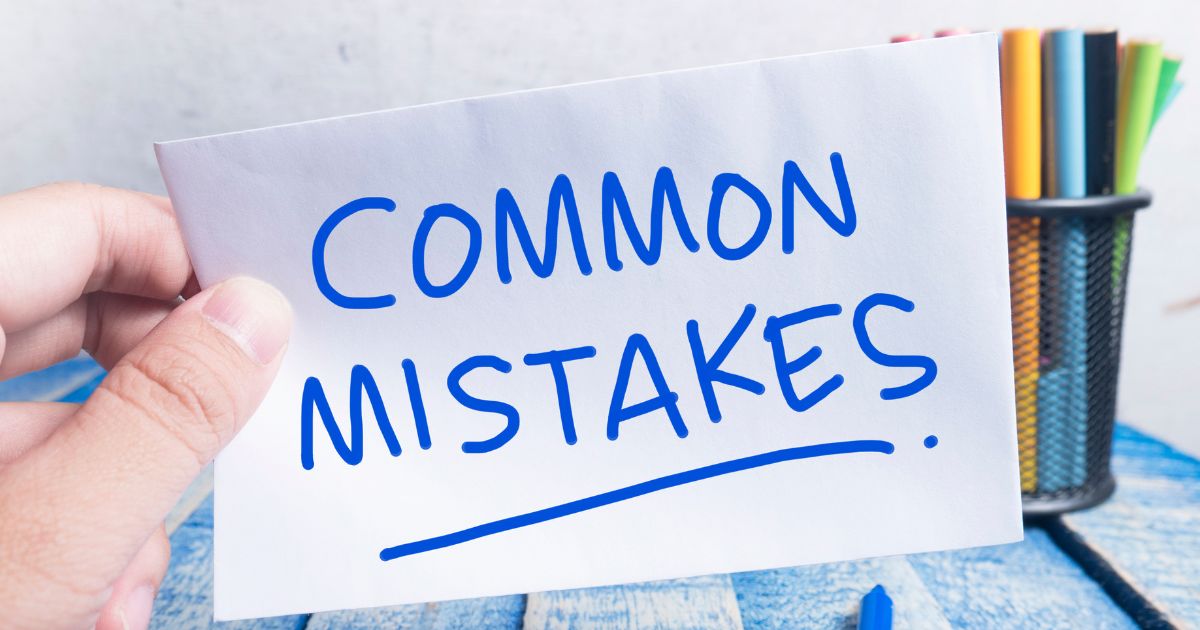
It was at a conference in the United States years ago where Lindiwe Matlali saw an eight-year-old present an app she had created. This inspired her.
Matlali told TimesLive that she had wondered why we didn’t have this happening in South Africa. “Computer codes are the backbone of the modern world,” she said.
She then did research on state of computer science education in South Africa. “I learned that information technology was only taught from grade 10 and only in affluent schools,” she told Global Citizen.
In 2014, Matlali had founded a nonprofit called Africa Teen Geeks – a non-profit organisation that teaches schoolchildren and unemployed youth how to code – with the aim to break barriers to ensure that no child is left behind in the tech revolution.
Years later, the organisation has reached over 48,000 children and has worked with over 1,300 volunteers.
Matlali’s social entrepreneurship accolades include getting acknowledgment from the Queen of England – Queen Elizabeth II recognised Matlali as the 86th Commonwealth Point of Light for her exceptional voluntary service in South Africa providing technology education to youngsters.
Locally, Matlali was also named one of the commissioners of the Presidential Commission on the Fourth Industrial Revolution (4IR).
The need to start Africa Teen Geeks
Matlali’s work within African Teen Geeks is also inspired by research from the Equal Opportunity Project at Harvard University that focused on “lost Einsteins.” The research found that children from wealthy families are more likely to be innovators, and that if a child meets an innovator, they are likely to grow up and be innovative, too.
She explained that Africa Teen Geeks started because “many children from townships do not have an opportunity to learn even basic computing, let alone coding. They are also not exposed to the awesome opportunities technology provides and that they can actually participate.
“I want to expose these kids to innovators so that they can be inspired, raise their aspirations, and break the cycle of poverty and disadvantage.”
She explained why these opportunities is necessary to every child in South Africa: “90% of the technology jobs we have didn’t exist 10 years ago- jobs from social media to data scientist,” she told She Distinction Blog.
“In fact every profession requires some sort of technology literacy; teachers, social workers, doctors all use technology. If we want to prepare our kids for industries and jobs of the future, we need to ensure that they are technology savvy. At African Teen Geeks, we have a special focus on girls because only 20% of ICT professionals in South Africa for example are women.”
She says her life’s mission is to close the opportunity gap in computer science for disadvantaged kids specifically from townships. “The majority of South African children do not have the opportunity to learn computer science.
“My goal is to expose them to computer science, helping to inspire Africa’s future generation of technology entrepreneurs and innovators,” she says.
This is in line with the UN’s Sustainable Development Goals, which are a collection of 17 global goals set by the United Nations General Assembly in 2015 for the year 2030.
The goals include quality education, reduced inequalities, decent work and economic growth and it has the power to end poverty and fight inequality.
How they make an impact
In 2015, Africa Teen Geeks successfully hosted its first computer science week where they exposed 12,500 children from disadvantaged communities to computer science at UNISA labs across South Africa.
Then, last year they signed a Memorandum of Understanding with the Department of Education to develop and implement the coding and robotics curriculum for grade R-9. As part of the programme, 48 000 teachers will be trained in the next five years to equip them with the necessary skills to teach the curriculum. The curriculum designed specifically for the South African market by focusing on the ‘E’ in STEM (Science, Technology, Engineering, Mathematics).
The organisation also hosts numerous events like workshops, hackathons and community outreach events to train and guide children, as well as unemployed youth.
High school learners are, for example, taught CS50 AP, Harvard University’s introduction to computer science, programming, and artificial intelligence. The younger participants starts with learning programming languages Scratch and Python.
Africa Teen Geeks’ projects include the following:
- Saturday classes in partnership with the University of South Africa (Unisa), where children from disadvantaged communities can learn coding on various Unisa campuses all over the country;
- Girl Geek Programme, which is educating and raising young girls to be future women in STEM. The programme links the girls to university students who provides mentorship;
- Teacher training programme, in collaboration with the department of education.
Our free #Coding Saturday classes continued this week at @UNISA labs in Parow, Kimberly, Bloemfontein, Nelspruit, Polokwane & Florida. #AfricaTeenGeeks #Gamedev #GirlGeek pic.twitter.com/A00uuAWOYf
— Africa Teen Geeks (@africateengeeks) April 13, 2019
So @KaraboMatlali has finished configuring her #drone on clean flight. I think she will definitely finish it over the holidays. I am so proud of my #Girlgeek. She has been learning how to create 3D models on @Autodesk Maya through @pluralsight. #beyondtheclassroom #GirlsinSTEM pic.twitter.com/szbtKvNFb2
— Lindiwe Matlali (@LindiweEM) April 14, 2019
Social entrepreneurs combine a social mission with business and successfully makes a real impact and help to bring about change.
Gus Silber, co-author of the book The Disruptors: Social entrepreneurs reinventing business and society told Brand South Africa that social entrepreneurs are people who contribute in a special way towards the economy and society. “We as a society tend to be concerned about prices and problems; we’re a crisis-driven society; we tend to worry about a lot.”
He added that although many of the social entrepreneurs are unknown to the public, they are people providing solutions. “The disruption mostly refers to technology, but people can disrupt – they are refusing to believe that things cannot be done.
“They (the social entrepreneurs) are all disruptors. They are positively disrupting the area around them. What they have in common is that nothing has come easy for them; they’re all restless.”
About social entrepreneurship, Matlali said that Africa Teen Geeks is not her full time job. “I am the founder and CEO of Apodytes a VR studio since 2008. Apodytes pays my bills and Africa Teen Geeks feeds my soul.”
A national ambassador
In February this year, President Cyril Ramaphosa said in his State of the Nation Address that South Africa had chosen to be a country of the future at a time when the world was changing at a pace and in a manner that was unprecedented in human history.
He said revolutionary advances in technology were reshaping the way people work and live. “Unless we adapt, unless we understand the nature of the profound change that is reshaping our world, and unless we readily embrace the opportunities it presents, the promise of our nation’s birth will forever remain unfulfilled.”
In the same Address, the President announced the establishment of a Presidential Commission on 4IR.
Matlali’s numerous awards for social entrepreneurship include Young Business awards top 3 finalist, Mail & Guardian Top young South Africans 2014 ,TechWomen Fellow 2017, Innov8tive Magazine Top 50 Visionary Women in #Tech To Watch in 2017, Destiny Magazine Power of 40 a list of South Africa’s powerful women under 40, Top 50 most inspiring women in tech 2017, MTN Women in ICT Community Builder Recognition Award 2018 and Fairlady/Santam Social Entrepreneur 2018.
Her background
Matlali grew up an orphan. She says her grandfather who raised her and her siblings on his pension, had always told her that education was her ticket out of poverty. She recalls her grandfather telling her that if you persevere at school, one day you will not even remember that you are an orphan.
“I am driven by my goal to make him proud and show the world that an orphan raised by a pensioner and a gardener could rise and study at some of the best universities in the world.”
Matlali’s education includes a Bcom degree in Economics and Statistics at the University of Cape Town, a General Management Programme Certificate in Innovation and Entrepreneurship at the Stanford University and currently a MS in Technology Management from Columbia University in New York.
She told She Distinction Blog that her upbringing made her want to change how she was being seen. “I hate it when people feel sorry for me and my whole life as an orphan people felt that they had to feel sorry for me. I was driven to work hard so that people would recognize my abilities and achievements rather than my status as an orphan. My being an orphan drove me to create a different narrative of how I was labeled and described.
She added: “One needs to be relentless in the pursuit of their goals. At times being stubborn when people tell you it can’t be done pays off.”
Learn more about Matlali is driving change through social entrepreneurship in South Africa.
Do you have co-founders? If yes, did us how you met and how did you put things in place to work together?
No I founded ATG on my own. I basically put together a plan and identified strategic partners such as UNISA and the SABC Foundation and approached them. Fortunately they bought and believed in the vision.
Tell us how you are disrupting the tech industry.
Well, I am a black woman who built Africa’s largest computer science NGO in 4 years.
What would you say is the value in social entrepreneurship?
Social entrepreneurship is important because it provides a framework for businesses to find their own success in the pursuit of helping others. Business is often perceived to be greedy and exploitative, social entrepreneurship is really business with the conscience.
Please share some highlights and challenges of running Africa Teen Geeks.
The biggest challenge is building a sustainable business model. The highlight is seeing the impact of your work in people’s lives. For me, our goal is to raise the aspirations of the kids we serve and watching them gaining confidence, dreaming bigger and believing in the beauty and possibility of their dreams.
Do you make money through your social enterprise?
You can earn a living from being a social entrepreneur. I personally do not because I have a for profit company that pays my bills. ATG is really my way of giving back. That’s why all our classes are free. We make money through sponsorships and consulting to corporates.
Growing up, did you ever think that you’ll be an entrepreneur?
I have always wanted to be an entrepreneur because I value my freedom.
Also, because I lost my parents when I was 4 years old I wanted to be the mother I imagined my mom to have been. So raising my kids and being there for every game, every parents meeting, every concert, helping them with their homework and yes, teaching them how to code is very important to me. Running my own business gave me the flexibility to plan my life around my children.
What lessons have you learned so far?
Perseverance. I got more no’s than yeses. Focusing and staying on course during the many painful disappointments taught me to master my emotions. I used to get easily emotional. I learned that I don’t have to respond to every fastball thrown my way. I always look ahead at the big picture.
What has been your highlights on your journey as an entrepreneur?
My highlight was partnering with the United Nations Office on Drugs and Crime (UNODC) to host our first Global hackathon in Silicon Valley last year and seeing my Africa Teen Geeks babies win. They beat kids from the US, Bolivia and Indonesia to win. The pride I felt is beyond words. It also demonstrated that the difference between children from Diepsloot and Sandton is access to opportunity. We have no talent deficit in this country.






